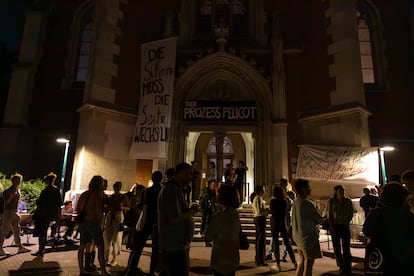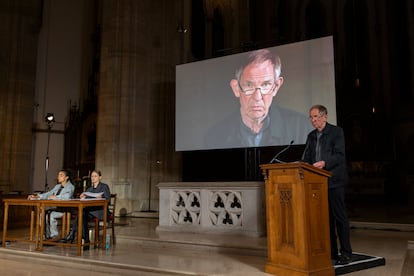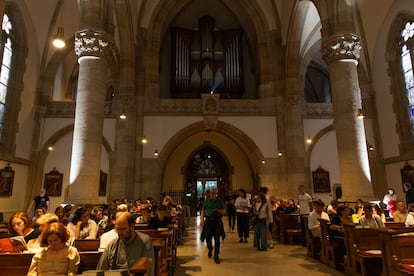"Shame must change sides": Vienna Film Festival stages the 'Pelicot Affair'

The chosen setting is the Catholic Church of St. Elisabeth next to the Belvedere Museum in Vienna's Wieden district. Instead of the 1866 altarpiece by the painter Franz Josef Dobiaschofsky depicting the miracle of the roses, a giant screen with the image of Gisèle Pelicot is displayed. Then actress Mavie Hörbiger , seated at a table at the main altar, begins to read: "From 2011 to 2020, Dominique Pelicot drugged his wife Gisèle and recruited dozens of men on the website coco.fr to rape her. The crimes mainly occurred at the couple's home and were filmed."
The proposal is ambitious, “perhaps a little kitsch ,” in the words of director Milo Rau : the performance should last “from dusk to dawn.” It lasts seven hours. Like a sociological study, say the authors, Milo Rau and French playwright Servane Dècle, the Pelicot case demonstrates that in a perfectly normal Western European city—Mazan, in the south of France, near Avignon—ordinary men of all social classes and ages are capable of a crime as extreme as the repeated rape of an unconscious woman. And with the play The Pelicot Trial: A Tribute to Gisèle Pelicot, part of the Vienna International Film Festival, they aim to reconstruct it in its entirety in a political act of remembrance.
Admission is free, but the church's limited capacity (260 seats) requires passes to be issued on a first-come, first-served basis. During the evening, free spaces will be assigned to the parishioners waiting at the door, next to a table with thermoses of coffee and a large white sheet on which the words "Shame must change sides" are written.

There were no rehearsals. 30 actors parade across the neo-Gothic altar, reading and reading. The staging of the production is minimal and reduced to a staged reading. Like an oratorio, the dramatic genre without stage representation, cobbled together from texts and usually staged in churches? “That was the name we were considering at the beginning,” Milo Rau replies hours before the performance at Vienna’s Funkhaus, the historic home of Austrian public radio, where the festival headquarters are located. The office resembles the premises of a university association, amid books, coffee makers, sagging old sofas, and a drill. “During the research, I was thinking about Peter Weiss’s oratorio, The Investigation , which essentially tries to demystify the Holocaust. He described ordinary people doing things they knew were wrong, but still did. I see a parallel with the Pelicot case .”
It's a different kind of dramaturgy to evoke emotion, built through painstaking research. Actress Safira Robens reads in the stage directions: "The following reading is a montage of various documents and materials: book excerpts, newspaper articles, the trial summary, interviews, and emails with journalists. Some passages, especially those describing the trial, have been reconstructed from journalists' notes."
The trial lasted more than three months between September and December 2024, and audio recordings were not permitted in the Avignon courtroom. In total, they worked with notes from more than 600 hours of hearings. They had the support of the family from the outset. The power of this documentary drama reaches its peak, in a Catholic church, with the description, as presented in the trial summary, of the videos of the serial rapes of Gisèle Pelicot in a comatose state, filmed by her husband, the person to whom she had been married for 50 years.

Gisèle Pelicot's decision to make her trial public so that shame would change sides, as she declared in the first sessions, made her a symbol of the feminist movement. But during the creation of the play, Servane Dècle was concerned about the story of "the good victim." "What would have happened if she weren't considered 'an impeccable woman'?" Dècle asks. "If she had a preference, for example, for unconventional sexual practices? Would the crimes committed against her have been less cruel?" In her book *The Call* , Leila Guerriero reconstructs the story of Silvia Labayru, a survivor of the Argentine dictatorship who was repeatedly tortured and raped by an officer. She reported the rapes in 2014. “Sons of bitches, I didn't tell because… because I was ashamed,” Labayru vents in a passage of the book, which explains that in those circumstances, enslaved in a kidnapping, it is understandable to even have sexual pleasure, which in no way changes the fact that it is still rape.
—How do you transfer this perverse demand for exemplarity to the theatrical text?
“Many questions in the courtroom interrogation revolve around that theme,” Dècle responds. “We also drew on the work of a team of anthropologists from the Norbert Elias Research Center, who conducted street interviews in Avignon to analyze the birth of an icon: “Sainte Gisèle.” To be able to identify with the victim and create an icon, their morality must be clean. And that’s very dangerous.”
And he adds:
— We also wanted to include a passage from Against Innocence by academic and poet Jackie Wang, which we ended up cutting.
"I think seven hours of reading is enough for the audience," Milo Rau says with a sarcastic smile. "But we do it convinced of the idea of public service inherent in theater."

Rau, a rich debater who often works with real stories and directs the Vienna Film Festival ( Wiener Festwochen ), conceived a three-day conference last weekend to discuss sexual violence in the arts, focusing on three cases: Otto Mühl, one of the leading exponents of Viennese Actionism; the actor Florian Teichtmeister, a former star of the Burgtheater; and the most famous German-speaking band in the world, Rammstein.
On July 18th, The Pelicot Trial will be performed in French at the Avignon Film Festival , the place where it all happened. And in the fall, it will be presented in Portuguese at the Lisbon Biennial of Contemporary Arts (BoCA). Rau will be at the Grec Festival in Barcelona in July with the play Medea's Children , which revisits a true crime story: that of a desperate mother who decides to kill her children and take her own life, but survives.
As the vernal solstice approaches, dawn breaks in Vienna at 4:30. By then, the oratorio has ended, with about 50 people left in the pews. The performance concludes with Agnus Dei , the choral composition by Samuel Barber. Lamb of God, who takes away the sins of the world, have mercy on us.
EL PAÍS



%3Aformat(jpg)%3Aquality(99)%3Awatermark(f.elconfidencial.com%2Ffile%2Fbae%2Feea%2Ffde%2Fbaeeeafde1b3229287b0c008f7602058.png%2C0%2C275%2C1)%2Ff.elconfidencial.com%2Foriginal%2F5e8%2F3ea%2F856%2F5e83ea8568f25a1a7fc708042462cb53.jpg&w=3840&q=100)
